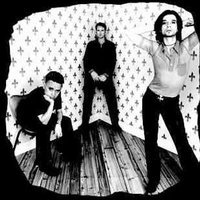Depeche Mode, despite its ’80s roots, doesn’t ever want to seen as an oldies act. The electronic pop group, which performs 9 p.m. Friday, Aug. 30, at Revel Casino Hotel in Atlantic City, released its 13th album, “Delta Machine,” in March and has just kicked off the North American leg of an extended world tour.
“We try not to think of ourselves as a group of the past –– that’s one of the reasons we’re still around,” says co-founder Andy Fletcher. “We still think we’re making good music now, and we still think there’s good music ahead.”
Once reviled by critics of its all-synthesizer sound and dance music focus, Depeche Mode has evolved over the years to deepen both the tone and content of its music, with the latest record even having a spare, bluesy sound.
The lineup has stayed constant with Martin Gore as keyboardist-songwriter and Dave Gahan as lead singer. (Vince Clarke, who wrote much of the group’s early music, exited shortly after the release of its first album, “Speak and Spell,” to launch Yazoo.)
Fletcher talks about how the group’s sound translates in concert, his role as “background boy” and its (mostly smooth) chemistry.
Q: “Delta Machine” has turned out to be lucky No. 13, making the Top 10 in the U.S. and going to No. 1 in several other countries. What’s the secret behind its success?
Answer: It was made in good spirits. We had a very good team of people around us. It’s astounding, we finished earlier than we were supposed to finish.
We really like the album, and the songs sound really good live. Sometimes you make an album, and the songs don’t really make it well live.
It’s quite minimal this album. Sometimes we’ve found more complicated songs don’t’ sound as good live.
Q: How do you approach material from the early part of your career for your live shows — do you update the arrangements or stay true to the originals?
A: We are a different band live than in the early days. We do have a drummer, where before we didn’t have one. With some songs, we rock on a bit more and change the arrangement.
On something like “Just Can’t Get Enough,” which is from 1981, we stick to how we sounded. We try to keep true to the original sound as much as possible.
Q: So many of your peer groups from when you started have broken up or retired. What keeps you going?
A: Lots of groups split up and members leave for different reasons. Maybe because we come from the same sort of small town in Essex in England and have the same backgrounds, we managed to stick together.
Q: How do you describe your role within Depeche Mode?
A: People are confused by our roles. We’re not really a conventional band. Sometimes on stage you have all three of us on keyboards. In other bands, it’s quite easy to point out the bass player or the lead guitarist or the rhythm guitarist. But we’ve always been different.
Dave is the frontman, and Martin is a great songwriter –– both are geniuses. You can’t have three geniuses in the band. I’m the background boy.
Q: What’s the chemistry like –– are you one of those groups that thrives on contention?
A: We’ve been through those times when it was crisis after crisis. Luckily now the mood in the camp –– touch wood –– is very good. The morale is very high in performing very well. After all those years, we’re enjoying ourselves.
Q: When was it less enjoyable?
A: The days when the after-show was more important than the show in the late ’80s and early ’90s. Now we’re getting on a bit, and we’re a lot more healthy. The gym is well-used in the hotels. We’re in a good state at the moment.
It’s a great position to be here after 30 years –– a dream come true, really. We only expected to last when we did to make it a couple of years. To be going strong now is a dream come true.
Depeche Mode drew on a range of influences from punk to “the glam stuff” when it was shaping its synthesizer-driven sound, according to co-founder Andy Fletcher.
“When we were 16, punk exploded — the Sex Pistols and things,” Fletcher recalls. “Then we started getting into Kraftwerk and electronic music, which started to become popular when cheap synthesizers became available, and people like David Bowie and the glam stuff.”
In turn, the group has been cited by a range of pop and rock artists, including Shakira, Coldplay, the Killers and MGMT.
To Fletcher, to be part of the pop conversation after all these years is all good.
“It’s an honor, something we never expected as a band,” Fletcher says. “We spent the early ’80s, especially in Europe, being hated by the rock critics because we were an electronic band. To have come all this way and to be seen as an influence is a fantastic thing.”


